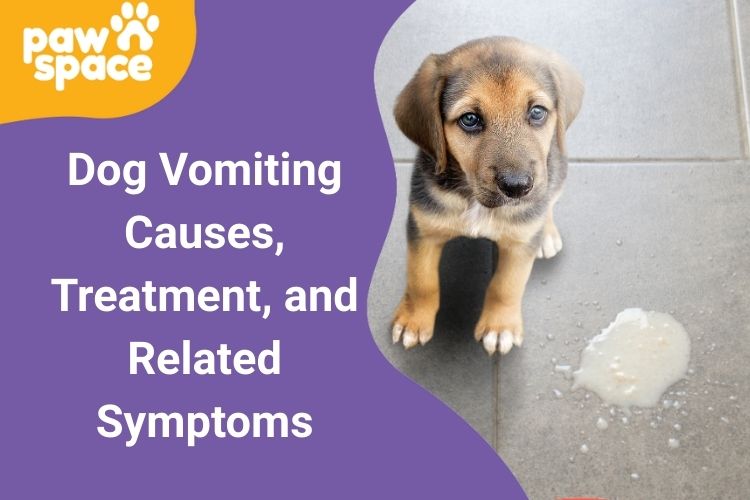If you are a dog parent, you know how quickly concern sets in when your pet refuses food and starts vomiting. It is not just about the mess, it is about the fear that something serious might be wrong. Dogs cannot tell us what hurts, so we rely on signs like appetite changes and vomiting to understand their health. When both symptoms appear together, it is important to pay close attention.This blog will assist you in learning why my dog isn t eating and throwing up, what to do at home, when to call on a veterinarian, and how PawSpace can assist you with professional and caring assistance o n Fresh Dog Food Bangalore.

Table of Contents
Toggle- My Dog Isn’t Eating and Throwing Up
- Understanding the Causes in Detail
- 1. Gastrointestinal Upset
- 2. Gastroenteritis
- 3. Pancreatitis
- 4. Intestinal Obstruction
- 5. Kidney or Liver Disease
- 6. Toxin Ingestion
- 7. Stress or Anxiety
- What You Can Do at Home If Your God is Not Eating and Throwing up
- => Withhold Food for a While
- => Provide Water
- => Introduce a Bland Diet
- => Monitor Closely
- When to Call the Vet
- How PawSpace Can Assist
- Conclusion
- FAQs
- 1. Is skipping a meal for dogs a normal occurrence?
- 2. What can I feed my vomiting dog?
- 3. Can stress bring on vomiting and loss of appetite?
- 4. Am I alarmed if my dog vomits once and appears to be okay?
- 5. How does PawSpace care for ill dogs at home?
My Dog Isn’t Eating and Throwing Up
Vomiting and loss of appetite are two of the most frequent warnings that something is amiss with your dog’s system. Individually, they may not be cause for concern. Together, however, they usually mean that your dog is ill, nauseous, or in discomfort.
These are some of the most frequent reasons:
- Gastrointestinal disturbance from consuming something out of the ordinary
- Infections like parvovirus or bacterial gastroenteritis
- Pancreatitis, commonly brought on by fatty foods
- Kidney or liver disease in older dogs
- Intestinal obstruction from ingesting toys or bones
- Ingestion of toxins, including chocolate or cleaning supplies
- Stress or excitement, particularly after travel or changes in the environment
- Medication side effects, including antibiotics or analgesics
Some of them are mild and resolve rapidly. Others need immediate medical care. The trick is to know how to distinguish.
Understanding the Causes in Detail
Let’s examine the most frequent reasons your dog is vomiting and won’t eat more closely.
1. Gastrointestinal Upset
Dogs love to investigate their food. A hasty morsel from the trash or bite of rotten food can bring on nausea and vomiting. This usually resolves within 24 hours. Vomiting persists or lethargy occurs, however, and re-evaluation is indicated.
2. Gastroenteritis
This condition is an inflammation of the stomach and intestines that often results from bacteria, viruses, or toxins. Symptoms are vomiting, diarrhea, and anorexia. Mild cases can be treated at home, but severe cases need veterinary attention and fluid therapy.
3. Pancreatitis
Pancreatitis is a painful and often secondary result of fatty meals like table scraps or oily treats. Pancreatitis causes dogs to vomit and refuse food, and they will even hunch over while in pain. Most cases of pancreatitis require blood work and supportive care.
4. Intestinal Obstruction
If the dog swallows a toy, bone, or sock, it is lodged in the digestive system. Vomiting, gas, and anorexia result. It is an emergency and most often is treated surgically.
5. Kidney or Liver Disease
These long-term diseases may result in nausea, vomiting, and loss of appetite. You may also see an increase in thirst, a loss of weight, or changes in the urine. Older dogs are particularly susceptible.
6. Toxin Ingestion
Chocolate, grapes, human medication, and cleaning supplies are poisonous to dogs. If poisoning is suspected, get to a veterinarian right away.
7. Stress or Anxiety
Dogs are sensitive animals. A move, new animal, or loud sounds can cause stress-associated nausea. Although this often heals itself, a behavioral support might be beneficial.
What You Can Do at Home If Your God is Not Eating and Throwing up
If your dog has vomited a few times and is not eating but otherwise appears to be perked up, the following are the things that you can do.
=> Withhold Food for a While
Rest your dog’s stomach by withholding food for 12 to 24 hours. This will minimize nausea and give the digestive system a chance to calm down.
=> Provide Water
Hydration is essential. Offer small sips of water or ice cubes. If your dog refuses water, try diluted chicken broth or unflavored oral rehydration solutions.
=> Introduce a Bland Diet
After the fasting period, offer boiled chicken and white rice in small portions. Avoid kibble, treats, or fatty foods until your dog’s appetite returns.
=> Monitor Closely
Monitor for worsening or improvement. If your dog continues to vomit, or if your dog becomes dehydrated, lethargic, or develops other signs, call your veterinarian.

When to Call the Vet
You should call the veterinarian if:
- Vomiting persists for longer than 24 hours
- Your dog will not drink water
- There is blood in the vomit or stool
- Your dog is weak, lethargic, or collapses
- You suspect poisoning or an ingested object
- Your dog is a puppy, senior, or has a chronic disease
- Prompt action can avoid complications and allow for quicker recovery.
How PawSpace Can Assist
PawSpace is India’s number one pet care platform, providing home-based, cage-free services that are focused on your dog’s comfort and health. If your dog is sick, PawSpace offers various solutions to help with recovery and alleviate stress.
Why Pet Parents Trust PawSpace
- Trained caregivers with pet health and first-aid verification
- Home-based care avoiding clinic stress
- Real-time updates with images, videos, and health updates
- Access to an emergency vet via trusted partners
- Personalized recovery plans for diet, medication, and rest
If your dog requires post-vomiting monitoring, a bland diet schedule, or a safe area to recover, PawSpace provides compassionate and professional attention.
Conclusion
It’s upsetting to see your dog ill, but you’re not alone. Vomiting and loss of appetite may indicate something minor or something critical. The most important thing is to remain calm, monitor carefully, and act swiftly.
With services such as PawSpace, pet parents in India have the benefit of expert care extending beyond the clinic. Whether your furry friend needs to rest, be monitored, or recover fully, PawSpace is there for you. Your pet is worthy of comfort, empathy, and top-notch care.
FAQs
1. Is skipping a meal for dogs a normal occurrence?
Yes, it is a normal occurrence for a dog to skip a meal because of mild nausea or stress. But if they vomit as well as experience some other symptoms, then a veterinary visit is warranted.
2. What can I feed my vomiting dog?
Begin with boiled chicken and rice. Do not feed anything fatty, such as treats, food, or kibble, until your dog’s appetite returns to normal.
3. Can stress bring on vomiting and loss of appetite?
Yes. Routine changes, travel, or anxiety can cause digestive upset. Behavioral support can assist.
4. Am I alarmed if my dog vomits once and appears to be okay?
Watch closely. If vomiting is one time and your dog otherwise is alert, it may resolve. Frequent vomiting is a veterinary visit.
5. How does PawSpace care for ill dogs at home?
PawSpace provides in-home nursing, nutritional support, and vet consultations to enable your dog to heal at home and in a comfortable, low-stress setting.
















